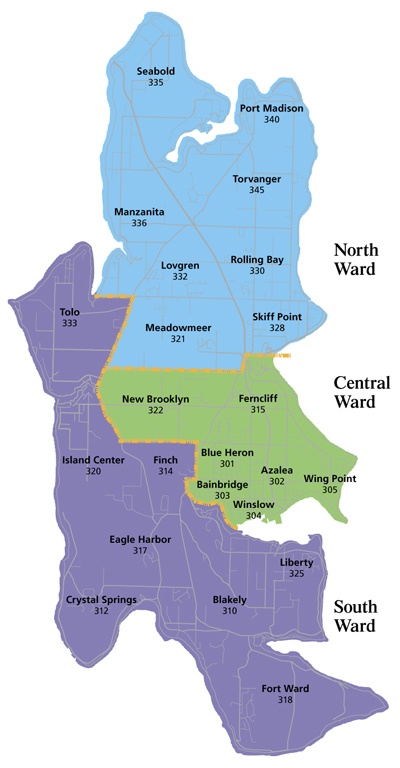Of the three City Council positions up for grabs this fall, the Central Ward features the most publicly disputed piece of land: Winslow Way.
Central Ward candidates Dee DuMont, Debbi Lester and Virginia Paul have to deal with the Winslow Way reconstruction and Waste Water Treatment Plant upgrade projects, both of which are important pieces of a lawsuit filed against the city by the Bainbridge Ratepayers’ Alliance.
Paul, a former school teacher and administrator, said her potential constituents are upset about how much of the projects the ratepayers have been forced to take on.
“People are angry about it,” she said. “What’s legal is what should be right.”
Paul said she doesn’t want to be outside the law on how money from the ratepayers is spent.
DuMont, who owns an upholstery business run by her daughter, cites fixing the infrastructure as her first priority, with the Winslow Way issues as the second most important issue.
The two sewer pipes that run into the Puget Sound need fixing immediately, she said.
“The Puget Sound is in fact bigger than we are,” she said. “When sewage spills into the Puget Sound it can affect everyone living on the Sound, not just us.”
DuMont’s biggest problem with the Winslow Way projects, in particular the reconstruction, is the funding. She said asking the 2,200 households in the area to kick in more than $4 million they are on the hook for is too much.
DuMont, who lives on Grow Avenue, said the people who are paying for the reconstruction aren’t the ones who have the most to gain.
“While it’s admirable that the business community decided to kick in $1 million, the major beneficiary will be the property owners,” she said.
DuMont did applaud the city for cutting the project’s budget down to its projected cost of $11.5 million.
Lester, who runs an arts magazine, said the Winslow reconstruction project must happen as soon as possible.
“We must fix our failing infrastructure,” she said. “Delay only adds costs and loses substantial funding we have already secured.”
The city has already secured nearly $6 million in grants to help pay for the project. And the city has said it could lose the grants if reconstruction doesn’t happen.
Lester said the current construction climate makes Winslow Way reconstruction even more of a necessity. More companies are bidding on the project at a lower price, and the cost of building materials has dropped, she said.
Though the candidates recognize the importance of Winslow Way, the three see curing the financial woes at City Hall as another top priority.
Paul, who often dealt with ailing school budgets, said using a zero budget – where the process begins with a budgetary figure of zero and councilors add programs and costs based on importance – would help the city prioritize.
During Monday night’s City Council forum, Paul said of the city’s 127.5 full-time employees, the city can afford about half of them based on the revenue coming in.
DuMont said she brings a philosophy of common sense and fiscal restraint. She said spending will have to be cut even more than it would have because the city is mired in such a tumultuous economic period.
Lester suggested a long list of ways the city can better its financial system. It all starts with conservative planning and spending, she said, and the city should conduct audits of departments and anticipate potential problems in the budget.
“Budgets should be a worst-case scenario,” she said.



